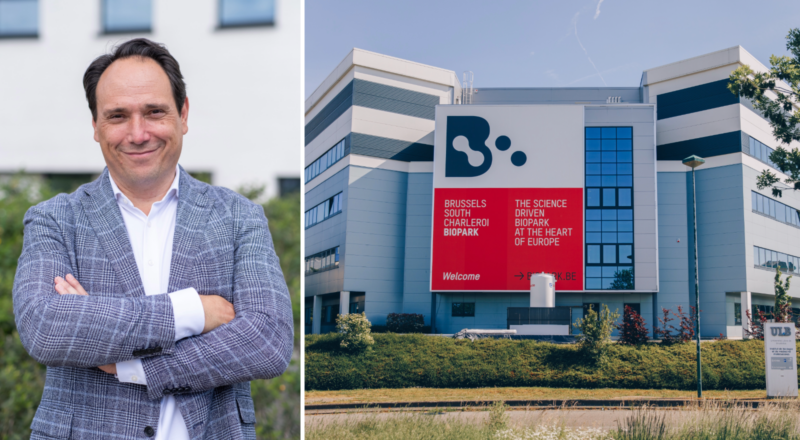Belgium, and Wallonia in particular, is a magnet for biopharmaceutical and biotechnology companies. Life sciences alone account for 15% of Belgian exports, generate 45,000 direct jobs and register some 446 patents per year*. The sector’s reputation extends far beyond Belgium’s borders.
Meet Dominique Demonté, the dynamic CEO of Biopark
The history of Biopark began in 1999 with the creation of a research institute by the Université Libre de Bruxelles. At that time, the site was home to around a hundred researchers. Today, the Biopark is a community of around 3,700 people in the Charleroi Métropole region of Belgium. The ecosystem includes a hundred companies active in the life sciences, ranging from large companies to start-ups from Europe, Asia and the United States.

Connecting the dots
« Our mission is to connect, support and develop the activities of our members by linking Biopark companies with academic, financial, recruitment, training, and public sector partners to ensure their development. We promote opportunities for collaboration between ecosystem players and service providers, while encouraging campus-wide initiatives. »
One of the priorities of the Biopark in 2025 will be the creation of a multi-operator training center dedicated to biomanufacturing & digital on the Gosselies site. The aim of this center is to provide training in the biomanufacturing of tomorrow!

Biopark Twin Transition
To accelerate its growth and strengthen its attractiveness, Charleroi Biopark has set up a partnership in 2023 with KPMG in Belgium to identify ways of accelerating the Twin Transition within the campus companies. This started with a study* to identify strategic priorities.
« The integration of digital technologies and environmental practices emerged as two key factors for accelerating growth and consolidating the competitiveness of the Biopark’s companies. Although digitalization is high on the agenda, most members consider themselves to be moderately mature. »
Key findings of the Biopark Twin Transition Study conducted by KPMG and Biopark
- Most participants consider themselves to be moderately mature (30% of small companies do not have a digital roadmap)
- The back-office & operations digital shift is ongoing (the digitalization within operations is more advanced in R&D vs production)
- The integration of artificial intelligence, mainly in R&D, and strengthening cybersecurity are among the main concerns (although it should be noted that only 20% of companies surveyed believe they have robust security measures in place)
- The ROI of digitalization is not yet measured consistently, although more than 30% of companies report that the digital transition has positively influenced their compliance with regulatory requirements (e.g. GDPR, GxP requirements)
- Ensuring the digital transformation requires partnership and human and financial resources, which remain real challenges

Julien Stocq, KPMG (left) – Dominique Demonté, Biopark (right)
Artificial intelligence is changing the way we do business. Is this also the case in life sciences?
« Artificial intelligence is already being used in drug development, and some companies have specialized in this area, using this technology to create predictive models. The integration of AI into biomanufacturing processes is now a reality. However, as the KPMG study shows, we do not seem to have reached the desired level of integration. »
What about cyber risks?
« Confidentiality management is an aspect that is largely considered by the Biopark’s companies, even if the KMPG study shows that companies could do better.
Biopark’s role is not to act as an IT service provider to guarantee IT security on the campus, but we would not rule out the possibility of calling on external service providers to offer cyber security packages.
We could also consider or propose the creation of a ‘medical device’ or ‘bioproduction’ cyber area. In general, we remain attentive and ready to listen to our members, to support them and, if necessary, to launch any initiative in the field of cyber security. »
Will Biopark’s leadership in the life sciences sector be consolidated by increased investment in technology?
« I’m convinced it will! And the results of the KMPG study, especially in terms of digital maturity, are not what I expected. So, it remains a challenge, and I’m convinced that hubs like Biopark, which are structured to support companies in their digital transition, will make the difference. One way of doing this could be to integrate a digital player into the campus itself.
One of the Biopark’s priorities in the coming years will be to be both a connector and a partner for Biopark’s members in their digital and environmental transitions! »

* Source: pharma.be
*Twin Transition journey KPMG survey involved 17 companies (Biotech, MedTech and service companies). The survey is available on request.


